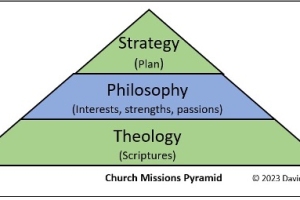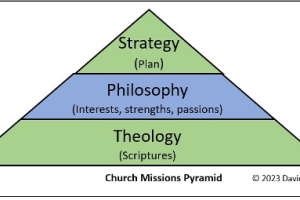
Today, I want to talk about the second level of the Global Missions Pyramid – philosophy. For a local church to effectively fulfill its responsibilities in global missions, she must understand who she is: her interests, strengths, and passions. Philosophy answers the question: Who are you? Your philosophy of missions should be an extension of your philosophy of church ministry. Think of philosophy as the inner chamber of your Global Missions Pyramid – the area reflecting who you are as a congregation and your priorities. This will differ from church to church.
Philosophy defines what your church has been uniquely equipped to do and might do naturally if you weren’t looking to see what others are doing. It is the bridge between theology and strategy. It is what you want to accomplish in missions in a general sense. Your strategy will determine how you fulfill your philosophy examined through the lens of your theology.
Philosophy grows out of theology but is formed based on your church’s characteristics, interests, strengths, and passions. So, philosophy can change over time as the church experiences changes in culture, leadership, interests, opportunities, and membership. This framework of global missions is the bridge between theology and strategy.
When you develop a philosophy of missions, you may discover that various aspects of your ministry are inconsistent with your church’s personality today, calling for adjustment.
Analyzing your ministry every few years will help keep it fresh, effective, and relevant. A SWOT analysis of your ministry can help you identify and understand your strengths, weaknesses, opportunities, and threats. There are many resources to help you do that.
Here are nine things to consider as you develop your philosophy statement:
- Audience – To whom are we compelled to minister? And who is your congregation?
- Balance – How do we balance domestic and international efforts?
- Focus – How broadly or narrowly should we spread our efforts?
- History – How has God developed, equipped, resourced, and connected our congregation? What values are important to us? How has God led us in the past?
- ‘Our Own’ – How important is a prior relationship to involvement with missionaries, partners, ministries, and projects?
- Our Roles – How has God uniquely gifted and connected our church?
- Participation – How do we want our folks to participate in missions?
- Partnerships – To what degree do we desire to partner with others?
- Tasks – What ministry tasks do we believe are most strategic in the world and fitting for our church?
Understanding and articulating your characteristics, interests, strengths, and passions as a church will help you develop a more effective and God-honoring global missions strategy.
Next time, I’ll talk about the next level of the Global Missions Pyramid: Strategy.

Taking Care of the Kids
Jun 28, 2024 2 min · Brian W To borrow from The Sound of Music: Has there ever been a problem like a missionary kid? Missionary kids fit into one of those problematic grey zones. They are not missionaries, but at the same time, they… Read More
Global Missions Strategy
Oct 16, 2023 1 min · David S Today, I want to talk about the pinnacle of the Global Missions Pyramid – strategy. For a local church to effectively fulfill its responsibilities in global missions, it must have clear strategic initiatives… Read More
Global Missions Theology
Aug 14, 2023 2 min · David S For a local church to fulfill its responsibilities in global missions, it must understand God’s mandate, His character, and His interests before the church can develop an effective and long-lasting strategy.… Read MoreAuthor
Dr. Selvey is a global missions coach with Missioserve Alliance. He offers workshops and coaching opportunities to help churches be better missionary senders. He helps pastors and missions leadership develop and articulate their theology, philosophy, and strategy for global missions.